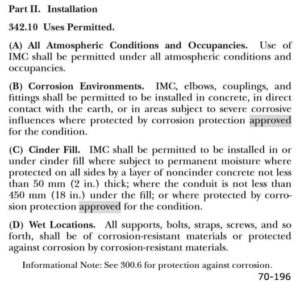If you're in the electrical industry, the NEC (National Electrical Code) is your bible. Article 344 is one of the many articles you need to know by heart. With its recent revisions, it's essential to stay up-to-date on the latest developments.
The Pain Points
Without getting too technical, Article 344 deals with rigid metal conduit (RMC), which is typically used in commercial and industrial electrical installations. The issue with RMC lies in its rigidity. It's not an easy material to bend or manipulate, making it more time-consuming and expensive to install.
The Target of NEC Article 344
The goal of NEC Article 344 is to provide guidelines for installing, inspecting, and maintaining RMC safely. The guidelines include sizing, installation, and support requirements that help ensure the integrity of the installation.
The Main Points
NEC Article 344 specifies minimum requirements for the installation of RMC. It covers everything from the sizing of the conduit to support requirements and the use of couplings, fittings, and other components. It also outlines the minimum distance between bends and the maximum number of bends allowed in any given section of RMC.
My Experience with NEC Article 344
My experience with NEC Article 344 has been relatively smooth. The most critical aspect is ensuring that you know the proper installation techniques and guidelines. It's essential to have access to the latest version of the NEC so that you can stay up-to-date with any changes.

Installation Challenges and Solutions
One of the biggest challenges with RMC is its rigidity. Bending it to fit around corners and other obstacles can be difficult, time-consuming, and expensive. However, using proper fittings and supports can make the installation process more manageable. It's also essential to have the right tools and equipment to make the job easier.

The Benefits of RMC
While RMC may be more challenging to install, it has several benefits that make it an attractive option for commercial and industrial installations. RMC is incredibly durable and can withstand exposure to extreme temperatures, corrosion, and physical damage. It's also fire-resistant, making it a safe choice for high-risk installations.
Safety Concerns
The safety of electrical installations is critical, especially in commercial and industrial settings. NEC Article 344 provides guidelines that help ensure the integrity and safety of RMC installations. Following these guidelines is essential to avoid accidents, injuries, and damage to property.
Questions and Answers
What is RMC?
RMC stands for rigid metal conduit. It's a type of conduit used in commercial and industrial electrical installations.
What are the benefits of RMC?
RMC is incredibly durable and can withstand exposure to extreme temperatures, corrosion, and physical damage. It's also fire-resistant, making it a safe choice for high-risk installations.
What are the installation challenges with RMC?
The biggest challenge with RMC is its rigidity. Bending it to fit around corners and other obstacles can be difficult, time-consuming, and expensive.
How can I ensure the safety of RMC installations?
By following the guidelines outlined in NEC Article 344, you can help ensure the safety and integrity of RMC installations, reducing the risk of accidents, injuries, and damage to property.
Conclusion of NEC Article 344
NEC Article 344 is essential to the electrical industry, providing guidelines for installing, inspecting, and maintaining RMC safely. While it may be challenging to install, RMC has several benefits that make it a popular choice for commercial and industrial installations. By following the guidelines outlined in NEC Article 344, you can help ensure the safety and integrity of RMC installations.
Gallery
Installed My NEMA 14-50 Yesterday | Page 2 | Tesla Motors Club
Photo Credit by: bing.com /
Nec Ampacity Table | Cabinets Matttroy

Photo Credit by: bing.com /
2017 NEC Article 342.10 - Thompson Learning - Home Of Electrical

Photo Credit by: bing.com / nec snippet
Cable Conduit Size - Wiring Diagram And Schematics

Photo Credit by: bing.com /
Hangers And Supports For Conduit - DoItYourself.com Community Forums

Photo Credit by: bing.com / conduit supports hangers table electrical doityourself between